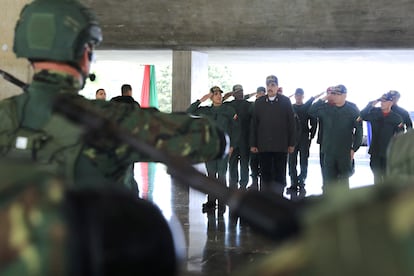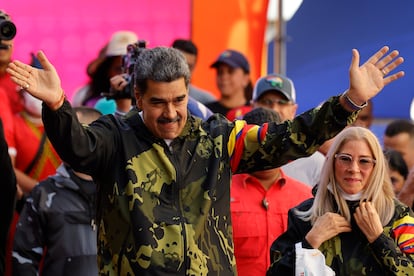Maduro announces military purge and declares Barbados agreements with the opposition ‘mortally wounded’
The Chavista regime denounces the existence of a plan to assassinate the president and casts doubts about plans for elections in 2024

Venezuela’s Ministry of Popular Power for Defense has published a statement indicating that 33 active military personnel — including a division general, two colonels, six lieutenant colonels and several captains — were subjected to a public act of demotion and expulsion for allegedly being involved in conspiratorial, “criminal and terrorist” activities against “the legitimately constituted authorities,” that is to say, against the government of Nicolás Maduro.
This information was released very shortly after the government announced that it had dismantled a conspiracy to assassinate Maduro, extending a repressive escalation that landed a teacher leader in prison. Authorities also announced the arrest of 32 more activists.
Maduro spoke again about the existence of a plan to assassinate him, and added: “Today the Barbados agreements are mortally wounded, I declare them in intensive care. Hopefully we can save those agreements, without plans to murder me.” The president of the National Assembly of Venezuela, Jorge Rodríguez, — one of the leaders of the PSUV party and head of the government delegation in the political negotiations with the opposition — issued some harsh statements in one of his parliamentary speeches, aimed at damaging the mood of consensus, attacking the opposition and galvanizing Chavista sympathizers around the slogan of “Bolivarian fury” declared by veteran politician Diosdado Cabello three days before.
Rodríguez also stated that the Barbados agreements “were hanging” (on hold), lambasting the Venezuelan opposition for its alleged conspiratorial activities. “I’m tired of hearing about free and fair elections,” said Rodríguez. “Free elections for whom? They ask for electoral conditions, while President Maduro cannot go out on the streets for fear of an attack.”

He added that “there is no way that this lady,” referring to opposition leader María Corina Machado, is going to be a candidate for anything in 2024. With or without opposition, with or without sanctions and with or without international observers, there will be presidential elections in Venezuela in 2024.”
While all this was happening, the vice president of the Republic (and Jorge Rodríguez’s sister), Delcy Rodríguez, met with a diplomatic delegation from the European Union in order to discuss the possibility of an electoral mission in the country.
European diplomats issued a statement in which they expressed their willingness to discuss with authorities the feasibility of this mission. Jorge Rodríguez had recently assured European diplomats, especially the head of diplomacy, Josep Borrell, that Europe would not participate in any electoral mission in Venezuela as long as he was in charge of that decision.
Throughout the month of January, the Supreme Court of Justice has been delaying an appeal by Maria Corina Machado’s lawyers to be informed about the causes of the ban against her holding office, and to invoke the violation of her political rights. This procedure had been suggested within the framework of the Barbados agreements.
On January 23 — the day on which the fall of the last military dictatorship in the country and the advent of democracy in 1958 is commemorated in Venezuela — Chavismo woke up on high alert and denounced a conspiracy. Several offices of Maria Corina Machado’s campaign headquarters were vandalized with graffiti, and two regional officials from her team were taken to prison.
Machado later published a video in which she denounced the Chavista attacks, and sent a message to its leaders: “Leave the fear, agree to put yourselves to the test in elections. Your time has passed, the people do not want you.” Although the Maduro government refuses to recognize it, Maria Corina Machado is, by far, the most popular political leader in the country, according to all recognized surveys, at a time of particularly low popularity rates for Maduro and Chavismo.
But, as in 2018, Maduro recently launched his electoral forecast at a public rally: “Even if it burns, even if it hurts, I will continue governing this country after 2024. We will win the presidential elections. We are joy and we are the majority.”
Sign up for our weekly newsletter to get more English-language news coverage from EL PAÍS USA Edition
Tu suscripción se está usando en otro dispositivo
¿Quieres añadir otro usuario a tu suscripción?
Si continúas leyendo en este dispositivo, no se podrá leer en el otro.
FlechaTu suscripción se está usando en otro dispositivo y solo puedes acceder a EL PAÍS desde un dispositivo a la vez.
Si quieres compartir tu cuenta, cambia tu suscripción a la modalidad Premium, así podrás añadir otro usuario. Cada uno accederá con su propia cuenta de email, lo que os permitirá personalizar vuestra experiencia en EL PAÍS.
¿Tienes una suscripción de empresa? Accede aquí para contratar más cuentas.
En el caso de no saber quién está usando tu cuenta, te recomendamos cambiar tu contraseña aquí.
Si decides continuar compartiendo tu cuenta, este mensaje se mostrará en tu dispositivo y en el de la otra persona que está usando tu cuenta de forma indefinida, afectando a tu experiencia de lectura. Puedes consultar aquí los términos y condiciones de la suscripción digital.








































